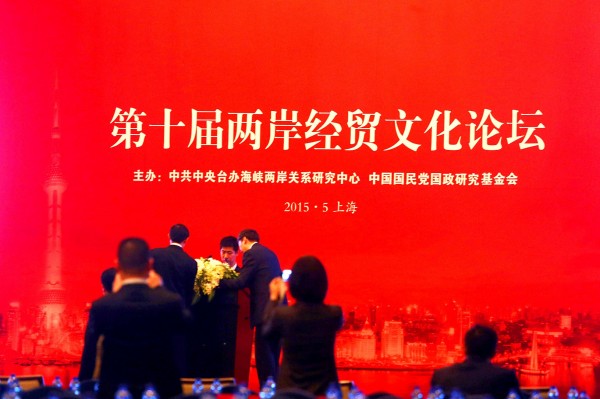《TAIPEI TIMES》 Close cross-strait loopholes: academics

Participants are gathered around the podium at the 10th annual Chinese Nationalist Party (KMT)-Chinese Communist Party cross-strait forum in Shanghai on May 3, 2015. Photo: CNA
DEVIOUS DIALOGUE: Xi is exploiting a legal loophole by presenting the possibility of dialogues before engaging in talks, a Taiwan Society of International Law member said
By Chung Li-hua / Staff reporter
Academics are calling on the government to pass amendments that would restrict an anticipated increase in the number of parties interested in seeking political dialogues with Chinese President Xi Jinping (習近平), which are currently permitted under legislation on cross-strait relations.
Article 5-1 of the Act Governing Relations Between the People of the Taiwan Area and the Mainland Area (臺灣地區與大陸地區人民關係條例) bars unauthorized institutions from negotiating or signing an agreement with Beijing, but not from engaging in “political dialogues,” Taiwan Society of International Law deputy secretary-general Lin Ting-hui (林廷輝) said yesterday.
Xi is trying to exploit a legal loophole in the act by presenting the possibility of cross-strait dialogues before engaging in talks with parties, organizations and individuals from Taiwan that are willing to accept his version of the so-called “1992 consensus,” he said.
In a speech delivered in Beijing on Wednesday last week, Xi defined the “1992 consensus” as “both sides of the [Taiwan] Strait belonging to one China and being willing to work together to seek national unification” and announced his plan to explore a Taiwanese version of the “one country, two systems” model.
The Chinese Nationalist Party (KMT) has maintained that the “1992 consensus” — a term that former Mainland Affairs Council chairman Su Chi (蘇起) in 2006 admitted making up in 2000 — refers to a tacit understanding between the KMT and the Chinese Communist Party (CCP) that both sides acknowledge there is “one China,” with each side having its own interpretation of what “China” means.
To push toward realizing Xi’s goal, Lin said that Chinese government agencies charged with handling cross-strait matters are expected to engage in frequent talks with Taiwanese on the “one country, two systems” model.
“To avoid legal liability, they are likely to use terms like ‘action guidelines’ or ‘action plans’” instead of agreements, Lin said, adding that pro-unification groups could also seize the opportunity to earn Chinese subsidies by attending related forums and seminars.
Lin urged the government to enact a piece of legislation similar to the US’ Logan Act, which criminalizes negotiation by unauthorized persons with foreign governments having a dispute with the US.
To sidestep Taiwanese law, the KMT published a document titled A Shared Vision for Peaceful Development of Cross-Strait Relations in the form of a press communique, following the landmark 2005 meeting between then-KMT chairman Lien Chan (連戰) and then-Chinese president Hu Jintao (胡錦濤), said a source with knowledge of the matter, who spoke on condition of anonymity.
Lien technically breached Article 5-1, but the administration of then-president Chen Shui-bian (陳水扁) interpreted the article as saying that the law could only be broken when a treaty was signed, the source said.
While no agreement was signed at the ensuing KMT-CCP forum, many deals benefiting Beijing were announced at the annual meeting before it was taken over by the Mainland Affairs Council and the Straits Exchange Foundation during former president Ma Ying-jeou’s (馬英九) administration, National Taiwan University professor of political science Chen Shih-min (陳世民) said.
Despite being renamed the Cross-Strait Economic, Trade and Culture Forum, the meeting still carries strong political connotations, Chen Shih-min said.
Another source who requested anonymity said that although the forum is conducted under the guise of economic and cultural exchanges, it would be difficult for it to avoid political dialogues.
As a China travel ban on Ma and former vice president Wu Den-yih (吳敦義) is to be lifted on May 20, there have also been concerns that the two could be used by Beijing to realize Xi’s plan for negotiations on unification.
At a time when the international community is quick to put in place measures to combat national security threats posed by China, legal loopholes could make other countries reluctant to be friends with Taiwan, Chien Hsin University of Science and Technology professor of business administration Yen Chien-fa (顏建發) said.
Yen called on the government to quickly act on President Tsai Ing-wen’s (蔡英文) plan to set up a three-part security network for cross-strait exchanges.
新聞來源:TAIPEI TIMES

















